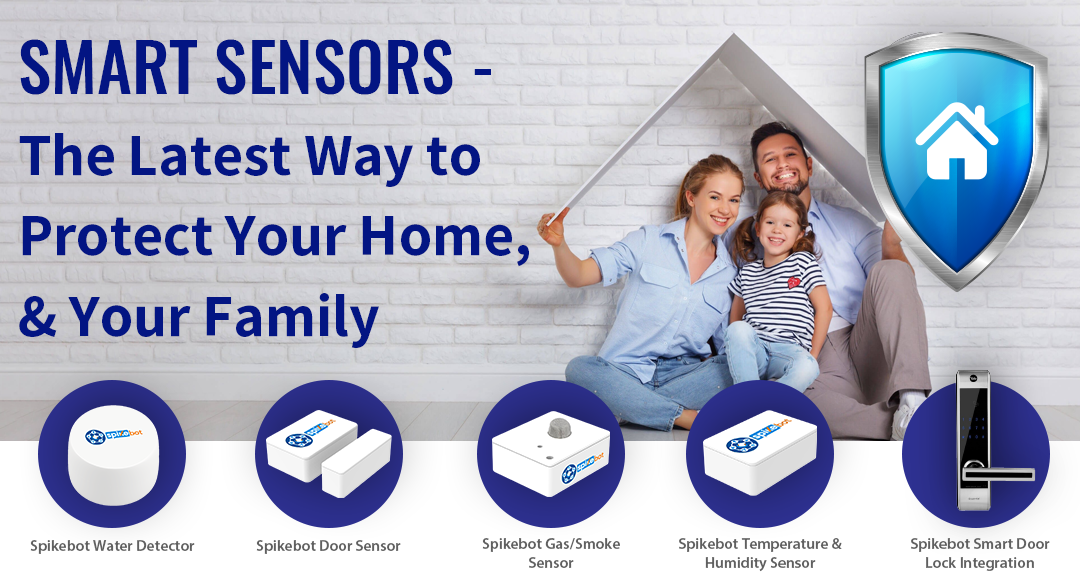Smart sensors – The latest way to protect your home, and your family

- Jun 04, 2021
- by Spikebot
Smart sensors – The latest way to protect your home, and your family
Smart security is exploding, particularly now that so many houses have a smart hub. Smart door sensors, motion sensors, door locks enable homeowners to be informed on their mobile device if something unusual occurs and initiate practical actions, such as turning on lights and heating before they get home. Let’s look at some of the ways smart sensors are being utilized to protect today’s houses.
As humans, our first goal is to protect ourselves. Who doesn’t want to be loved, safe, and feel the same way everyone else does? So why not get home security? When it comes to their loved ones’ homes, everyone has a different sense of protection. However, with the arrival of Home automation system using IoT, our perception of intelligent home security has shifted dramatically.
What was previously merely a sci-fi movie plot is now becoming a reality. The digital revolution has infiltrated our homes. When it comes to home automation, even a smart door lock system plays a vital role. Let’s begin with the statistical facts.
Stats for smart sensors and home automation system using IoT
According to market research, the worldwide smart sensor market was valued at $37.12 billion in 2019. and it is expected to reach $91.37 billion by 2027, at a CAGR of 14.30 percent from 2020 to 2027. A smart sensor is a significant technical advancement that allows for improved management and monitoring of various processes. It includes Smart door sensors as well as motion sensors for lights.
In 2025, Smart Homes’ penetration rate will be 21.4% across the globe. Imagine the growth, demand, and hype of a Home automation system using IoT.
Now, let us see a few of the smart sensors which help to make our home secure.
Smart Home sensors
The good news is that you can help protect yourself, your house, and your family from the hardships connected with house and property damage. Simply by using the Internet of Things, smart home sensors such as a smart door lock system, smart motion sensor detectors, leakage detectors, etc.
Here is a list of eight sensors that you may install in your house to ensure your safety by implementing a Home automation system using IoT.
1. Smart door sensors
Door and window sensors alert you when people enter and exit your home, and they may even switch lights on and off when doors open and shut. A smart door lock system is your first line of protection against intruders; some sensors can even detect when an intruder damages a window.
These smart door sensors warn you of prospective intruders, as well as aberrant teenagers. Again, wireless technology enables you to get alerts directly to your phone or tablet and to contact for assistance if necessary swiftly.
2. Leakage detection sensor
Water and freezing damages are the second most common reason for house insurance claims. Nobody likes to receive the dreaded phone call notifying them that their home has water spilling out of it and that water is seeping into the apartment just below them. Your ice maker’s water line broke, and the water has been flowing nonstop for 24 hours. This is a costly mishap.
A moisture detection sensor may alert you if your property is in danger owing to frozen pipes or a burst waterline. These water leakage sensors detect leaks in your house so that you can address the issue quickly before it causes damages.
When implementing a Home automation system using IoT, it’s better to proactive rather be reactive.
3. Motion detection sensor
A motion sensor performs exactly what its name implies: it detects motion and movement in a given region. When you are not at home, these sensors can inform you if there is activity inside your house or if your doors or windows have been opened or closed.
Smart door sensors work as motion detection sensors too. They work as an additional set of eyes for you, alerting you to unwelcome activity in your house, such as a teen sneaking out (or in) or a youngster entering a prohibited location, such as a medicine cabinet.
Motion sensors are also useful for reducing energy use. These sensors may be linked to lighting or the thermostat to assist regulate energy use in space depending on occupancy, for example, turning off the lights if no one is in the room or adjusting to an energy-efficient temperature when the room is vacant.
Motion sensors may now be linked to video, so you will not only get a signal when a sensor is triggered, but the sensor will also start video recording to capture footage of the incursion.
4. Fire and CO detection sensor
Fire is by far the most common source of property damage. For years, the basic fire detector has been blaring at the first indication of smoke in the house. Still, numerous forms of pollutants may affect our home environment and air quality, all of which may result in property damage and danger to the people within.
Some modern sensors can detect smoke and CO and monitor the entire air quality in your house, looking for pollutants such as dust, soot, pollen, temperature, humidity, air staleness, pollution, and particles. Even more attractive are the insurance company rebates that are available when you employ these sensors.
5. Hub/intercom
You’ve put in sensors to build your smart home, and now you need to control everything from a single spot. The intelligent home hub and intercom system coupled to the Smart door locking system enable access to all your intelligent home sensors, a communications network across the home and the ability for emergency or maintenance services with a button.
Wrap Up
SpikeBot has been in business for the past five years. However, we have not remained still in terms of technological breakthroughs and the development of security systems and Home automation system using IoT.
Why not speak with one of our experts now if you want to go smart with your home security using Smart door sensors or a Smart door lock system? Contact us at [email protected] for more information about smart home automation.

